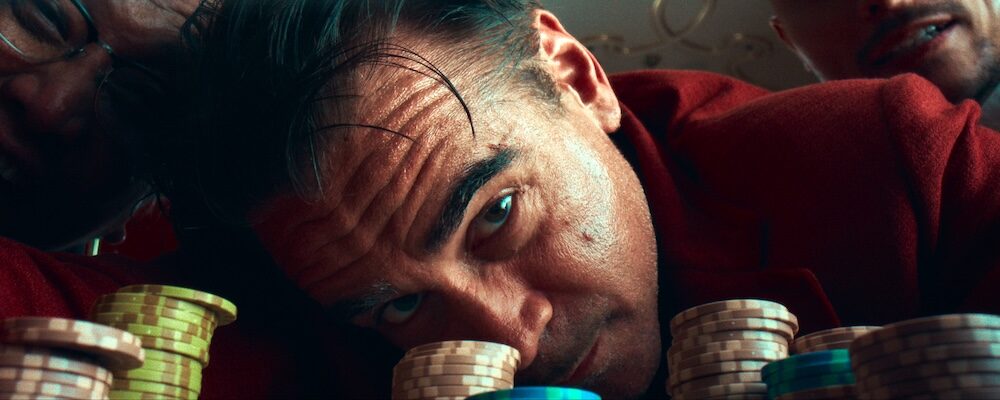Colin Farrell Is a Feverish Gambler in Edward Berger’s Unfocused ‘Ballad of a Small Player’
Alci Rengifo
For most of its running time, Edward Berger’s “Ballad of a Small Player” features a startling performance by Colin Farrell, one that defines tension. Sweating, paranoid and boxed in, Farrell’s delivery fully captures the feeling of a life spiraling totally out of control. In a very ironic way, the same can be said about the film itself. As if desperate to keep up with the actor, Berger’s technique is a nonstop display of cinematic fireworks in the editing, cinematography and production design. The style fully overtakes the story, to the point that it nearly becomes meaningless. You are bombarded with the luxury and terror of a gambling lifestyle, wondering what this movie is even trying to say.
Farrell plays Lord Doyle, a gambler in Macau managing to stay in a lavish hotel despite running up an absurd line of credit at the casino where he spends every waking minute. Doyle is clearly a gambling addict. He shamelessly needs friends to cover bar tabs, inspiring the clear empathy mixed with pity of Dao Ming (Fala Chen), who works at a casino mostly frequented by an older rich woman who taunts her opponents. Just as his luck keeps running further and further down the abyss, Doyle spots a mysterious woman taking his photo. When he confronts her, she reveals herself to be Cynthia Blithe (Tilda Swinton). A financier Doyle ripped off in London has hired Cynthia as a private investigator to track him down. He now has two options: Deliver back all the money he stole in 24 hours or face arrest and deportation back to England.
The screenplay by Rowan Joffé is an adaptation of a Lawrence Osborne novel, marking this as Berger’s third use in a row of published source material. His last two films were the searing Oscar winner “All Quiet on the Western Front” and the engrossing “Conclave,” both taken from a great classic and a respected bestseller. A major difference is that those films had some clear aims in their storytelling. “Ballad of a Small Player” begins as a breakneck entertainment, but can then become as tiresome as being the designated driver for a wild drinker who won’t slow down. The first act is the best, since it is primarily Doyle going on suicidal gambling runs knowing full well Cynthia is keeping watch. Farrell, who has grown into a truly notable actor, looks like a man who is about to burst, playing hands he knows he can’t win and gorging himself on drinks and fine foods he cannot afford. We feel the clock ticking down to the deadline Cynthia has imposed on the gambler.
Berger proceeds to tease the audience with what seem like familiar story avenues. When one of Dao Ming’s clients commits suicide, after apparently accumulating a monstrous debt they couldn’t pay, she too needs to go on the run. She and Doyle end up in her waterfront boat/home, tasting what could be domestic bliss. She lures him into swimming and catching fish. They share existential conversations under the stars. Dao Ming writes “lost soul” on his palm, because what else could he be? For a moment it feels like a story of redemption with the pace finally slowing down. Then, Berger finds a quick excuse to have Doyle fall into temptation and make his way back to Macau for even wilder bouts of gambling in casinos Berger and cinematographer James Friend shoot like glittering, massive temples to avarice.
This could have been a parable about the corruption of the soul, or loneliness, or recklessness. “Leaving Las Vegas,” “Rounders” and “The Gambler” all did it much better and with less frenetic excess. Berger seems to be trying to be sly by not saying anything clearly about his character. Why should we care for Doyle? Because he’s crazy enough to try and pay off his debts with higher and higher forms of risky behavior? What arc does the character even undergo? At the end of the movie he is almost back to the beginning, or at least refreshed enough to start on a downward spiral all over again. It might have worked better had Berger also not opted for a truly absurd twist near the end worthy of M. Night Shyamalan’s more laughable story climaxes. Instead of finding a grounded, moving way to emphasize Doyle’s potential for change, we get a semi-supernatural explanation that doesn’t go with the previous, hyper realism of the narrative. It would have been easier for Doyle to just get a heart attack, alcohol poisoning or indigestion. He does enough to qualify for all three throughout the movie.
Because the team at work is so skilled, “Ballad of a Small Player” still boasts impressive visuals. Macau becomes a combination of shiny allure and hell. Lavish game rooms, hotel suites and buffets contrast with Doyle’s physical and mental collapse. Towering over it is Colin Farrell’s exhausting performance. His trajectory has always been one of the more fascinating of the last 20 years. Tapped early on for would-be blockbusters, Farrell’s best work has been with a crop of unique directors that include Yorgos Lanthimos, Martin McDonagh and Joel Schumacher. Now when he does a franchise like “The Batman,” his growth as a thespian is truly on display even when caked under pounds of makeup to play the Penguin. Berger is the latest notable director to tap into Farrell’s talent. This just isn’t one of his best films, especially when compared to “All Quiet on the Western Front” and “Conclave,” which were such compelling critiques of war and power structures. Maybe Berger wanted to have some fun. His film gets caught up in its own fever and loses its focus, with Farrell’s great mania keeping it somewhat together.
“Ballad of a Small Player” begins streaming Oct. 29 on Netflix.

